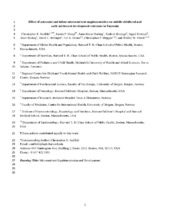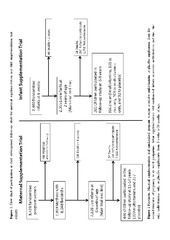| dc.contributor.author | Sudfeld, Christopher R. | |
| dc.contributor.author | Manji, Karim P. | |
| dc.contributor.author | Darling, Anne Marie | |
| dc.contributor.author | Kisenge, Rodrick | |
| dc.contributor.author | Kvestad, Ingrid | |
| dc.contributor.author | Hysing, Mari | |
| dc.contributor.author | Belinger, David C. | |
| dc.contributor.author | Strand, Tor A | |
| dc.contributor.author | Duggan, Christopher P. | |
| dc.contributor.author | Fawzi, Wafaie W. | |
| dc.date.accessioned | 2020-06-19T09:45:50Z | |
| dc.date.available | 2020-06-19T09:45:50Z | |
| dc.date.issued | 2019 | |
| dc.Published | Sudfeld, Manji KP, Darling AM, Kisenge, Kvestad I, Hysing M, Belinger, Strand TA, Duggan CP, Fawzi WW. Effect of antenatal and infant micronutrient supplementation on middle childhood and early adolescent development outcomes in Tanzania. European Journal of Clinical Nutrition. 2019;73:1283–1290 | eng |
| dc.identifier.issn | 0954-3007 | |
| dc.identifier.issn | 1476-5640 | |
| dc.identifier.uri | https://hdl.handle.net/1956/22766 | |
| dc.description.abstract | Background: There is growing evidence that nutritional interventions in the first 1000 days of life may influence long-term health and development outcomes. Few studies have examined the effect of maternal and infant micronutrient supplementation on development outcomes in sub-Saharan Africa. Methods: We conducted a follow-up study of two randomized trials of antenatal and infant micronutrient supplementation conducted in Dar es Salaam, Tanzania. We assessed the effect of maternal multiple micronutrient (MMN) supplementation in pregnancy on development of children at 11–14 years of age. We also examined the effect of infant zinc and MMN supplementation on development at 6–8 years of age. We used generalized linear models to assess standardized mean differences (SMDs) in general intelligence, executive function, and mental health scores. Results: We followed up 446 children whose mothers were enrolled in the maternal MMN supplementation trial and 365 children who were enrolled in the infant zinc and MMN supplementation trial. We found no effect of maternal MMN supplementation on general intelligence (SMD: −0.03; 95% CI: −0.15, 0.09), executive function (SMD: 0.00; 95% CI: −0.11, 0.11), and mental health scores (SMD: 0.06; 95% CI: 10.10, 0.22). We also found no effect of either infant zinc or MMN supplementation on any of the three development domains (p-values > 0.05). Conclusions: We found that antenatal MMN supplementation and infant zinc and MMN supplementation did not have a large effect on development outcomes in middle childhood and early adolescence in Tanzania. | en_US |
| dc.language.iso | eng | eng |
| dc.publisher | Nature | eng |
| dc.title | Effect of antenatal and infant micronutrient supplementation on middle childhood and early adolescent development outcomes in Tanzania | eng |
| dc.type | Peer reviewed | |
| dc.type | Journal article | |
| dc.date.updated | 2020-01-02T20:30:06Z | |
| dc.description.version | acceptedVersion | |
| dc.rights.holder | Copyright 2019 The Author(s) | eng |
| dc.identifier.doi | https://doi.org/10.1038/s41430-019-0403-3 | |
| dc.identifier.cristin | 1687618 | |
| dc.source.journal | European Journal of Clinical Nutrition | |

